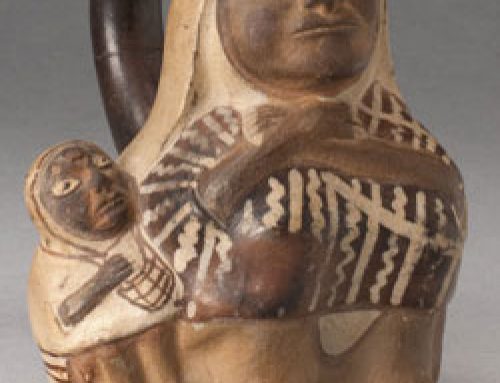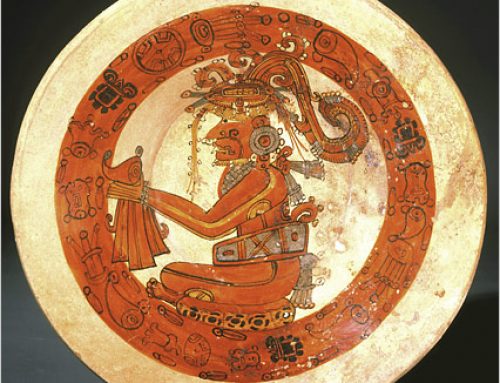
Oldest known portrait of Paul (catacomb of Thecla, Rome, 300s AD)
Paul starts out as Saul
Saul was a Jewish man who converted to Christianity near the very beginning of the new religion. After he converted, he took the Christian name Paul.
Judaism in the time of Jesus
More about Christianity
Roman Empire articles
Paul preaches Christianity
In the 30s and 40s AD, soon after Jesus was crucified, Paul travelled all over preaching Christianity. He went to Greece and to what’s now Turkey and to Damascus in Syria.
Paul in Corinth, Greece
What did Paul say?

Roman fountain in Corinth
A new thing that Paul did was to preach to people who were not Jews. Paul told people that Jesus wanted them to be good – they should never tell lies, or steal, or cheat anyone in a trade. But Paul said that love was more important than any of these things (I Corinthians).
Paul also told people that Jesus didn’t want anybody who got divorced to remarry. A man could only have one wife, and a woman could only have one husband. And he said that women should obey their husbands, and not speak in public. At this time, Roman women were fighting to get more rights. So maybe Paul was part of the backlash against their feminism.
Women in the Roman Empire
Women in West Asia
How was Paul different from Jesus?

A woman from Roman Egypt, holding a notebook and a pen
Jesus hadn’t really told people how to live: he was more concerned that the world was about to end. He told people how to get to heaven. Paul was organizing a community of Christians, and he told people how to live as Christians.
More about Jesus
The first Christians in Rome
Thanks to Paul’s preaching, and the preaching of other apostles, a lot more people became Christians. By the time of the Roman Emperor Claudius, in the 40s AD, there may even have been Christians in Rome.
Who were the apostles?
More about Emperor Claudius
The Roman historian Suetonius (writing about 100 AD) said that “Claudius threw out of Rome the Jews who were always making a fuss in the name of Chrestus.” Suetonius means a time about 15 years after Jesus was crucified (but he was writing written about 85 years later).
Who was Suetonius?
Did the Romans kill Paul?

Peter being crucified, from a mosaic in the church of Monreale, Italy (1130s AD)
Around the same time, about 50 AD, tradition tells us that Roman officials killed both Paul and the apostle Peter in Rome for being Christians. According to the story, Peter asked to be crucified upside-down so he wouldn’t die the same way as Jesus.
Nobody is sure if any of this is true, or exactly what the charge was. Being a Christian was not actually illegal until around the reign of the Roman Emperor Trajan, about 100 AD. But maybe they were killed for disturbing the peace, or just for public preaching.
Learn by doing: write and preach a sermon yourself
Nero and the Great Fire in Rome
Christianity becomes illegal
Bibliography and further reading about Paul:





If I’m perfectly honest, this is a rather poor description of Paul, especially the sections on what he said and how he compared to Jesus, and I hope the high school students I teach do not discover it. I am not an expert by any means, but I was successful in earning my master’s at Princeton Theological Seminary and think my insight is valuable.
To say that Paul told people to be good is a gross oversimplification. Paul’s letters often include moral teaching (paraenesis), but this typically comes after reminding his audience that they have been saved through faith in Jesus. In Paul’s view, once one is saved, God’s Spirit breaks into the world through them (Romans 8:1-17), similar to Jesus’ proclamation that the kingdom is at hand (Mark 1:14-15). For Jesus, the kingdom being at hand produces repentance (i.e., “doing good” as you put it). Paul regularly emphasizes that he preaches Christ and him crucified (1 Corinthians 1-2) and that his resurrection is the essential component of the Christian faith (1 Corinthians 15), a point that Jesus himself emphasizes (Mark 8:31-31; 9:30-32; 10:32-34). This reading of Paul’s view of women is also cursory and highly speculative. One scholar actually argues that he uses feminine language to an extent unheard of in ancient times (see Our Mother Saint Paul by Beverly Gaventa), and the care he encourages the church to have for widows, who would have been severely disadvantaged in Roman society, is also noteworthy.
For one of the most influential figures in Western history, I would have hoped more time would have been put into this.
Hi Michael,
It sounds like what you mean is that this is not a very Christian view of Paul, which is true – this is not a Christian site. I imagine the view you get of Paul in a Christian religious institution is rather different from our view here. And of course we do simplify a lot here, if we’re going to sum up Paul’s teachings in a paragraph or two!